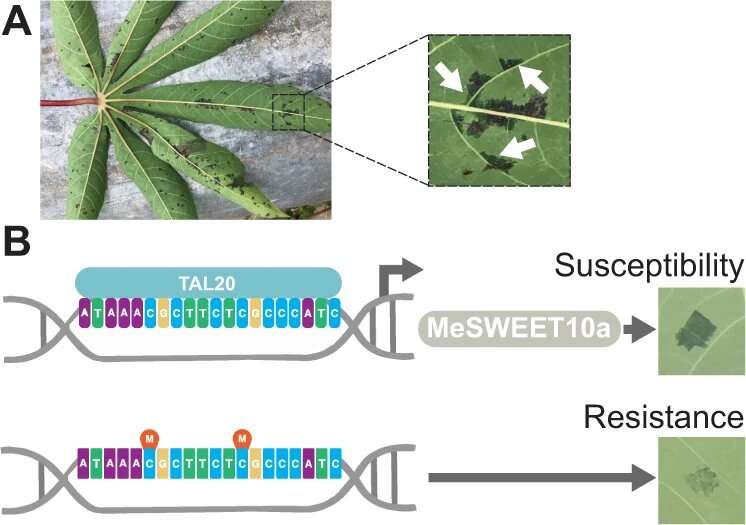This article has been reviewed according to Science X's editorial process and policies. Editors have highlighted the following attributes while ensuring the content's credibility:
fact-checked
peer-reviewed publication
trusted source
proofread
Researchers publish new epigenetic editing technique to improve crops

Cassava is one of the most important crops in the tropics, feeding half a billion people in more than 80 countries. Cassava bacterial blight (CBB) is a devastating disease that causes crop losses worldwide.
Pioneering research led by Rebecca Bart, Ph.D., member, Donald Danforth Plant Science Center, and her collaborators at the University of California at Los Angeles and University of Hawaii at Manoa demonstrated that a new technology, epigenome editing, can reduce CBB symptoms in cassava plants while maintaining normal growth and development.
These findings will not only increase cassava resistance to CBB, with the potential to improve yields for farmers but also lay the groundwork for using epigenome editing to improve other crops. Their work, Improving cassava bacterial blight resistance by editing the epigenome, was recently published in Nature Communications.
"This was the first time that targeted methylation was used to introduce an agronomic trait into an important crop," said Danforth Senior Research Scientist and first-author Kira Veley, Ph.D. The research team deployed the technology to deliberately improve disease resistance to CBB, and the resulting cassava plants had smaller and less intense symptoms of the disease on their leaves.
Epigenetics is a natural process that cells use to control gene expression without changing the DNA sequence itself and methylation is one such type of DNA 'decoration.' "Targeting methylation to specific sites in the epigenome is a really new thing," said Danforth Center President, Chief Executive Officer, and co-author Jim Carrington, Ph.D.
This research was the result of a long-standing collaboration between Danforth Center scientists and Steve Jacobsen's lab at UCLA. The Jacobsen lab conducts fundamental research on methylation and epigenetics. Their work is a powerful demonstration of the value of applying new techniques to under-resourced crop species, and their methodology has the potential to be replicated successfully in many other plant systems in the future.
"One of the wonderful things about this project was the successful transfer of knowledge between a model plant system, Arabidopsis, and an important food security crop, cassava. Crops like cassava are often left behind when it comes to new frontiers in technology. This is one reason we are particularly excited to have applied these tools in cassava first," said Bart.
The Bart lab is continuing to investigate cassava bacterial blight, including identifying the environmental factors that lead to outbreaks and how global climate change will influence the disease. The researchers are also interested in the heritability of their new CBB-resistance trait and are currently growing plants in Hawaii to test inheritance across generations. In addition to CBB, several viruses limit cassava yields and so the team is excited to continue their work and potentially develop novel control strategies for additional diseases.
More information: Kira M. Veley et al, Improving cassava bacterial blight resistance by editing the epigenome, Nature Communications (2023). DOI: 10.1038/s41467-022-35675-7
Journal information: Nature Communications
Provided by Donald Danforth Plant Science Center



















